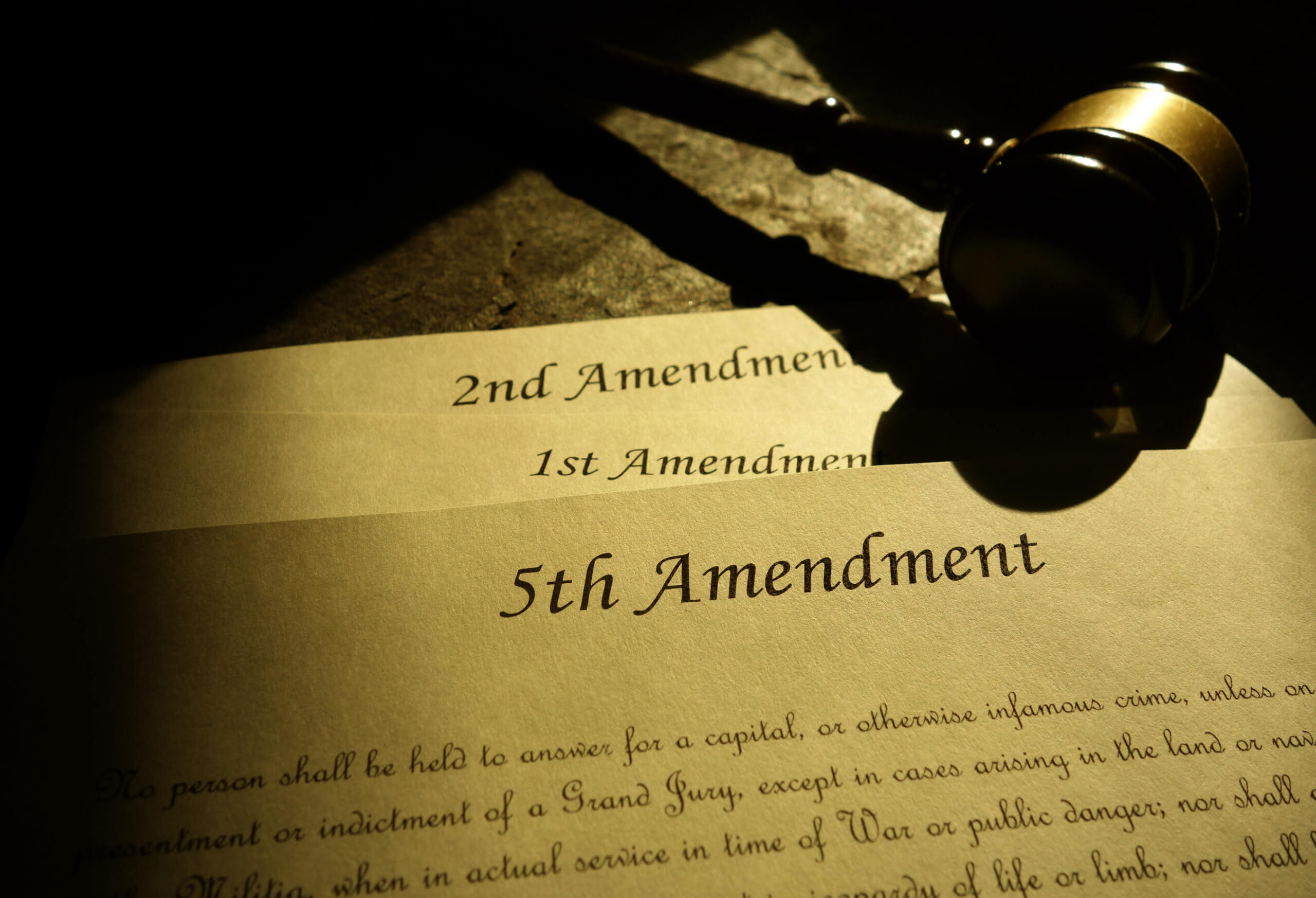Picture yourself in a cinema, the aroma of popcorn accompanying a riveting legal drama on screen. The scene hits a climax as the main character, wrongly accused, dramatically invokes the 5th Amendment. This portrayal, so frequent in American media, belies the intricate realities of this fundamental legal protection.
The 5th Amendment is more than a dramatic script element. It embodies key legal tenets. Yet, its cinematic representation frequently strays from its actual significance, breeding misconceptions.
Join us as we dissect the true essence of the 5th Amendment. We aim to correct the myths propagated by the entertainment industry and highlight its indispensable role in upholding our freedoms. Continue reading to uncover the reality behind dramatized trials and scripted dialogues.
Overview of the 5th Amendment
The 5th Amendment guards individual liberties and enshrines several fundamental rights. At its core, it shields against self-incrimination so individuals do not have to testify against themselves. This protection upholds the principle that one is innocent until proven guilty. Furthermore, this critical element of the Bill of Rights addresses the following:
- Double Jeopardy: prohibiting a person from going through a trial for the same offense twice
- Due Process: guaranteeing fair treatment through the judicial system regarding life, liberty, or property
- Eminent Domain Clause: allowing the government to purchase private property for public use
- Grand Jury Clause: requiring federal criminal charges to go through a citizen review
Common Misconceptions and Popular Culture
The 5th Amendment often gets shrouded in a veil of dramatic flair and oversimplification. One of the most glaring is the portrayal of the right to remain silent to add suspense or signal guilt in movies and TV shows. This dramatized interpretation overlooks the intention.
Moreover, the details of due process, eminent domain, and double jeopardy get lost or exaggerated for narrative convenience. These skewed portrayals contribute to a public misunderstanding more rooted in fictional narratives than reality. Such distortions not only misinform but also engender cynicism and mistrust.
The Right to Remain Silent and Miranda Rights
The right to remain silent is a long-standing trope in fictionalized crime shows. This right is a critical defense against self-incrimination, emphasizing that proving guilt is the state’s responsibility. Contrary to its depiction in movies and TV, it is not an admission of guilt or a deceitful tactic. It is about safeguarding the rights and dignity of the accused.
Miranda Rights, stemming from the 1966 Miranda v. Arizona case, are also misunderstood in popular culture. These rights inform suspects of their right to silence and legal representation during questioning. While often dramatized or oversimplified in media, Miranda rights are fundamental to the justice system. They balance the need for crime investigation with the individual’s right to legal protection.
Double Jeopardy: What It Really Means
Double jeopardy is also subject to misinterpretation in popular culture. It ensures that the government does not come after you for the same crime twice. It is critical to preventing overreach and providing finality in legal proceedings. However, films and TV shows sometimes overlook this constitutional safeguard.
The reality of the Double Jeopardy Clause is more complex. It doesn’t prevent trials for different crimes arising from the same actions. Additionally, it doesn’t stop separate prosecutions by state and federal governments. This intricacy is often oversimplified in media for dramatic purposes.
Furthermore, double jeopardy isn’t always applicable, like in cases of mistrials or overturned convictions on appeal. Understanding these nuances is vital to avoid misconceptions about the legal system.
Due Process and Eminent Domain
Due process is central to receiving fair and just treatment in the legal system. It includes rights like a fair trial and legal representation. Contrary to its occasional portrayal as a loophole, it is about maintaining the integrity of the legal system. Moreover, it exists to protect against arbitrary or unfair government actions.
Eminent domain, another aspect of the 5th Amendment, is also subject to public misconceptions. While the media often depict it as a heavy-handed government power, the reality involves constitutional protections for property owners.
The government can take private property for public use but must provide just compensation. This process includes legal challenges and negotiations, ensuring a balance between community needs and individual rights. Contrary to its dramatic portrayals, eminent domain includes safeguards for property owners to contest eminent domain.
Impact of Misconceptions on Public Understanding
Misunderstandings of the 5th Amendment, often fueled by its portrayal in popular media, significantly affect public perception of the legal system. Dramatic representations in movies and TV shows lead many to form skewed views of legal rights and processes. This misinformation can create distrust towards legal institutions and impact jurors.
These distortions also influence daily interactions with the legal system. For example, people may not effectively use their Miranda Rights during police interrogations due to misconceptions. Alternatively, misunderstandings about eminent domain can result in property owners making poorly informed decisions.
Talk to a Local Attorney About Your 5th Amendment Case
Understanding the 5th Amendment is more than a matter of legal accuracy. It’s vital for the preservation of our liberties and the integrity of our judiciary. Unfortunately, it often gets clouded by misconceptions perpetuated through popular culture.
Do you have concerns about a legal situation involving the 5th Amendment? Then, ask us for a referral to local legal help. Call our representatives anytime at (866) 345-6784 or submit this easy form today.

